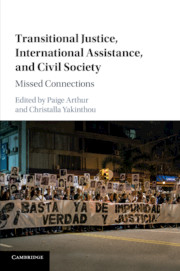Book contents
- Transitional Justice, International Assistance, and Civil Society
- Transitional Justice, International Assistance, and Civil Society
- Copyright page
- Contents
- Tables
- Contributors
- Foreword
- Acknowledgments
- Introduction Changing Contexts of International Assistance to Transitional Justice
- Part I Understanding the Cases
- 1 From Reconciliation to Rule of Law
- 2 Fighting Windmills, Ignoring Dragons
- 3 Sending the Wrong Signal
- 4 Off the Agenda as Uganda Moves toward Development
- 5 Hybrid Court, Hybrid Peacebuilding in Cambodia
- Part II Conceptualizing the Connections
- Conclusion Refocusing on Civil Society: How to Make – not Miss – Connections
- Annex: Interview Guides
- Index
5 - Hybrid Court, Hybrid Peacebuilding in Cambodia
from Part I - Understanding the Cases
Published online by Cambridge University Press: 23 March 2018
- Transitional Justice, International Assistance, and Civil Society
- Transitional Justice, International Assistance, and Civil Society
- Copyright page
- Contents
- Tables
- Contributors
- Foreword
- Acknowledgments
- Introduction Changing Contexts of International Assistance to Transitional Justice
- Part I Understanding the Cases
- 1 From Reconciliation to Rule of Law
- 2 Fighting Windmills, Ignoring Dragons
- 3 Sending the Wrong Signal
- 4 Off the Agenda as Uganda Moves toward Development
- 5 Hybrid Court, Hybrid Peacebuilding in Cambodia
- Part II Conceptualizing the Connections
- Conclusion Refocusing on Civil Society: How to Make – not Miss – Connections
- Annex: Interview Guides
- Index
Summary
- Type
- Chapter
- Information
- Transitional Justice, International Assistance, and Civil SocietyMissed Connections, pp. 144 - 174Publisher: Cambridge University PressPrint publication year: 2018

